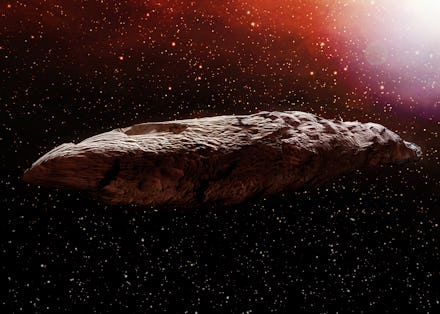That weird asteroid from 2017 might have been aliens, says Harvard astronomer

The weird cigar-shaped object that flew past Earth in 2017 could've been alien technology, claims the head of Harvard's astronomy department, but humans didn't realize it because we're not the "smartest kid on the block."
The somewhat harsh assessment comes from Dr. Avi Loeb, Harvard's top astronomer and the author of a new book called Extraterrestrial: The First Sign of Intelligent Life Beyond Earth. He contends that astronomers were too quick to brush the odd asteroid aside as something natural instead of investigating it further.
"Most of the mainstream astronomy community continued with 'business as usual' and ignored 'Oumuamua's anomalies," Dr. Loeb told Vice. Instead of looking into the object, they made up reasons why it existed. "Some mainstream astronomers tried to explain the anomalies but needed to invoke objects that were never seen before, like a hydrogen iceberg or a 'dust bunny,' that are not likely to survive the long interstellar journey."
And that's a damn shame, he believes, because 'Oumuamua was so unique and its characteristics didn't deserve to be explained away so quickly.
First of all, 'Oumuamua was no mere stone hurdling through space — it was about 1,300 to 2,600 feet long and 131 feet wide. This gave it a strange, elongated shape reminiscent of a cigar.
"That's a very unusual shape," said Paul Chodas, manager of NASA's Center for Near Earth Object Studies, in a 2017 video released by NASA. "We don't see that in our solar system. None of the asteroids in our solar system look like that. So it's very puzzling how it could've obtained this shape."
Additionally, 'Oumuamua was reddish in color, indicating that it came from somewhere outside of our solar system. It also lacked the particles and gases that usually surround and trail a comet, known as the coma. It was moving unusually fast as well, tumbling head-over-heels, and accelerating in speed as if being pushed. 'Oumuamua's trajectory was also weird, grazing around the Sun and back out of our solar system again. This is in contrast to other objects that just get caught in our Sun's orbit and circle around the neighborhood.
Scientists have hypothesized 'Oumuamua was just some anomaly that relied on hydrogen to speed past us. Others say the hydrogen theory isn't grounded in real physics. But, overall, the majority of the astronomy community believes 'Oumuamua was a natural object.
Dr. Loeb disagrees. He wants humanity to keep an open mind about the possibility of extraterrestrial life.
"My point is that it is very difficult to explain the weird properties of 'Oumuamua with conventional natural processes, so studying objects of its type in the future will either educate us about an unusual natural source or about another civilization," Dr. Loeb explained to Vice. "Let's collect evidence and not rely on prejudice."
In an op-ed written for Scientific American in September 2020, Dr. Loeb lamented that his fellow scientists relied so much on "conventional wisdom" to come to a conclusion rather than "having the humility to subject their assumptions to experimental tests."
"While pursuing research, we could miss important discoveries if we expect the future course of science to resemble its past history," he wrote. "When you are not ready to find exceptional things, you will never discover them."